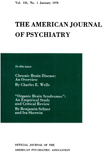The role of neurosis in phylogenetic adaptation, with particular reference to early man
Abstract
The author hypothesizes that neurosis results from maladaptation and leads to further maladaptation, thus creating a vicious cycle that can be viewed as having played a significant role in human evolution. Individuals who were less successful in the struggle for survival during prehistory would have been more likely to become neurotic, a maladaptation that would magnify existing genetically transmitted differences in their viability and affect both the choice of a mate and the viability of their offspring. This process would have accelerated human evolution by favoring the most viable. The author relates this theory to his concepts of assortative mating and to other theories of the role of neurosis.
Access content
To read the fulltext, please use one of the options below to sign in or purchase access.- Personal login
- Institutional Login
- Sign in via OpenAthens
- Register for access
-
Please login/register if you wish to pair your device and check access availability.
Not a subscriber?
PsychiatryOnline subscription options offer access to the DSM-5 library, books, journals, CME, and patient resources. This all-in-one virtual library provides psychiatrists and mental health professionals with key resources for diagnosis, treatment, research, and professional development.
Need more help? PsychiatryOnline Customer Service may be reached by emailing [email protected] or by calling 800-368-5777 (in the U.S.) or 703-907-7322 (outside the U.S.).



